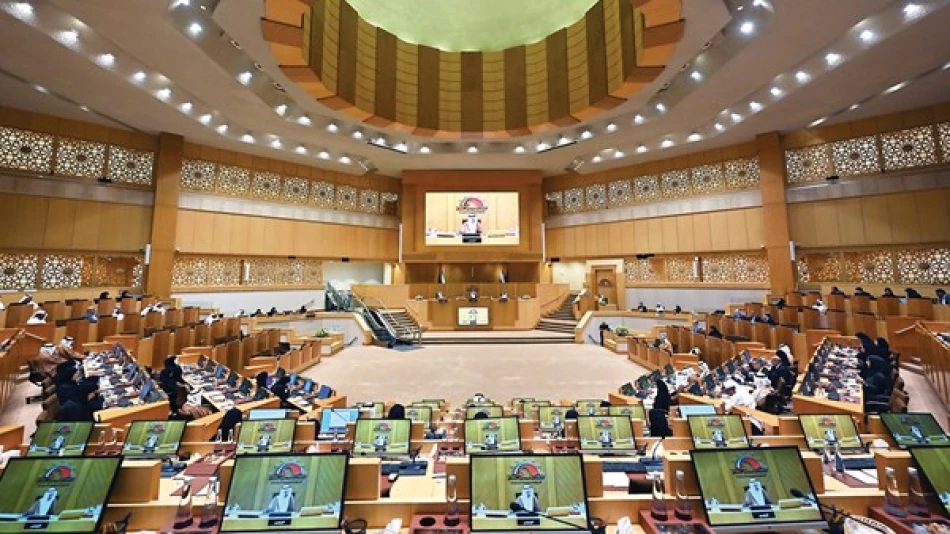
The Federal National Council: Embodying the Visionary Leadership and Aspirations of Emirati Citizens
UAE Parliament Champions "International Democracy" Model on World Democracy Day
The UAE Federal National Council is marking International Democracy Day by promoting a groundbreaking concept of "international democracy" that could reshape global governance. As the Emirates celebrates five decades of parliamentary evolution, its leadership advocates for democratic principles to extend beyond national borders into international decision-making bodies, challenging the current power structures that dominate global institutions.
From Tribal Consultation to Modern Parliament
The UAE's democratic journey reflects a unique fusion of traditional Arab governance and modern parliamentary systems. The concept of shura (consultation) has deep roots in Emirati society, predating the federation's establishment in 1971 by decades. When the UAE was formed, this traditional consultative approach was institutionalized through the Federal National Council, which held its first session on February 12, 1972.
The founding vision, articulated by the late Sheikh Zayed bin Sultan Al Nahyan, emphasized that "the responsibility of building the renaissance in this country does not fall on the government alone, but the people participate in this responsibility through opinion, thought, consultation, and diligent work." This philosophy established a governance model that balances traditional leadership with citizen participation.
Progressive Electoral Reforms
Under the late Sheikh Khalifa bin Zayed Al Nahyan's leadership, the UAE implemented significant democratic reforms, including direct elections for half of the Federal National Council's members and ensuring women's participation as both voters and candidates. Since 2019, women have achieved 50% representation in the council—a milestone that surpasses many established democracies globally.
Redefining Democracy on the Global Stage
The UAE's most ambitious democratic initiative extends beyond its borders. During recent parliamentary meetings with world leaders, the Emirati parliamentary delegation proposed the concept of "international democracy"—arguing that global decision-making through the United Nations and other international organizations should operate on democratic principles where all nations have equal sovereignty.
This proposal challenges the current UN Security Council structure, where five permanent members hold veto power over global decisions affecting 193 member states. The UAE's vision suggests that international governance should mirror democratic principles, ensuring fair representation and collective security.
Strategic Implications for Global Governance
The UAE's international democracy concept arrives at a critical moment when global institutions face legitimacy challenges. Rising powers like India, Brazil, and African nations increasingly question Western-dominated decision-making structures. The Emirates, as a bridge between East and West, positions itself as a neutral advocate for reform.
This approach aligns with the UAE's broader foreign policy strategy of multilateral engagement and conflict mediation. By promoting democratic principles internationally while maintaining stable domestic governance, the UAE seeks to enhance its soft power and influence in global affairs.
Institutional Innovation and Citizen Engagement
The Federal National Council has evolved beyond traditional parliamentary functions, developing innovative citizen engagement mechanisms. Parliamentary committees conduct field visits, organize discussion forums, and invite experts to contribute to legislative processes. This approach ensures that parliamentary reports reflect diverse perspectives from civil society.
The council's permanent and temporary committees actively engage with communities when discussing agenda items, creating feedback loops between citizens and lawmakers. This participatory approach has strengthened the legitimacy of legislative outputs and enhanced public trust in democratic institutions.
Regional Leadership in Parliamentary Diplomacy
Through eighteen legislative sessions, the UAE parliament has established itself as a regional leader in parliamentary diplomacy. The council actively participates in international forums focused on democracy and human rights, positioning the UAE as a moderate voice advocating for gradual democratic development rather than revolutionary change.
This measured approach resonates with other Gulf states seeking to balance traditional governance with modern democratic expectations. The UAE's model demonstrates that democratic development can occur within existing cultural and political frameworks, offering an alternative to Western-imposed democratic transitions.
Future Implications
Under President Sheikh Mohammed bin Zayed Al Nahyan's leadership, the UAE continues expanding democratic participation while maintaining political stability. This balance becomes increasingly important as regional neighbors experience political upheaval and democratic setbacks.
The UAE's international democracy proposal, while ambitious, reflects growing global demand for institutional reform. As traditional powers struggle with domestic political polarization, middle powers like the UAE may find opportunities to shape international governance structures. The success of this initiative will depend on building coalitions with like-minded nations and demonstrating that democratic principles can enhance rather than threaten international stability.
Most Viewed News

 Layla Al Mansoori
Layla Al Mansoori






